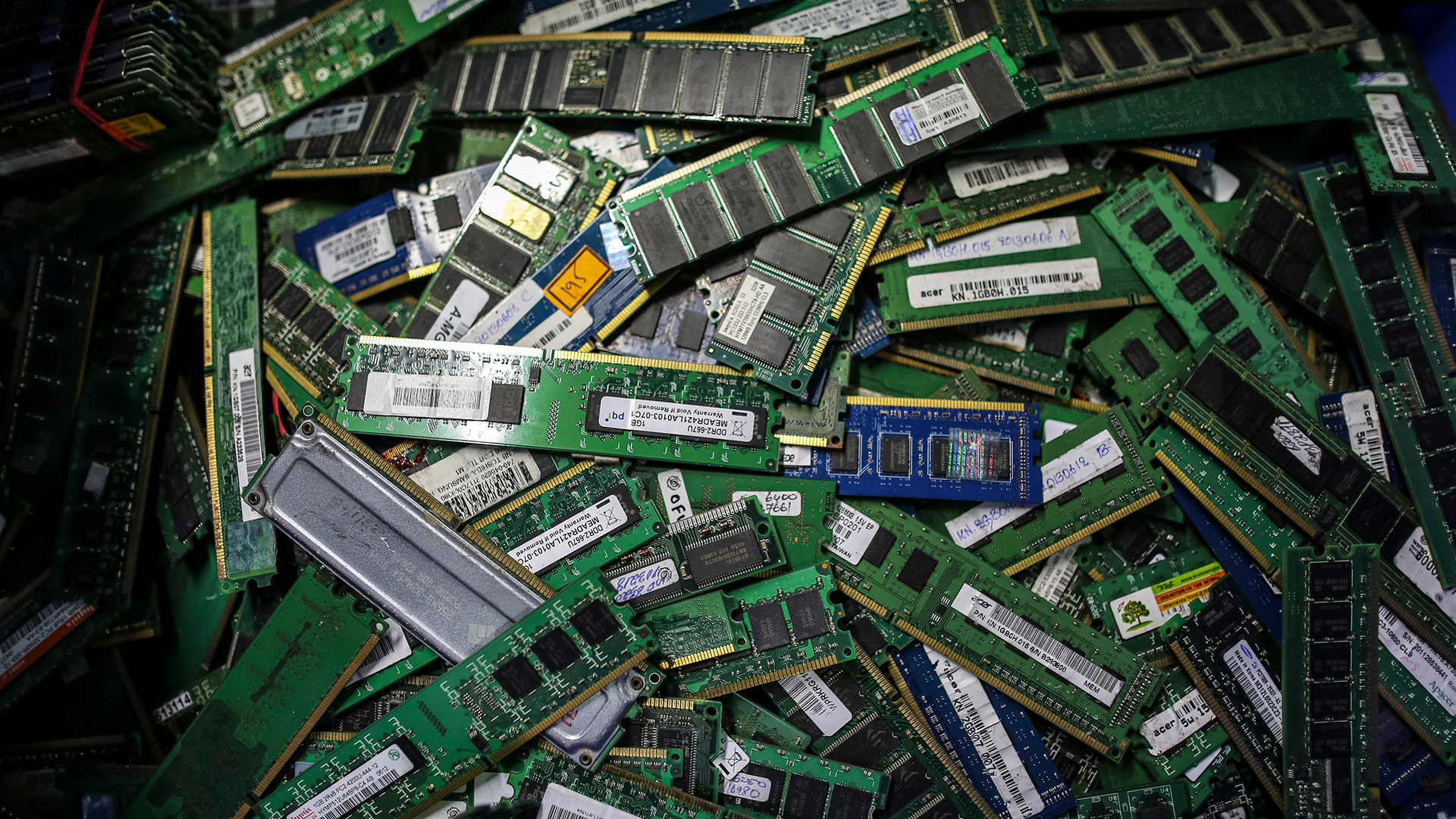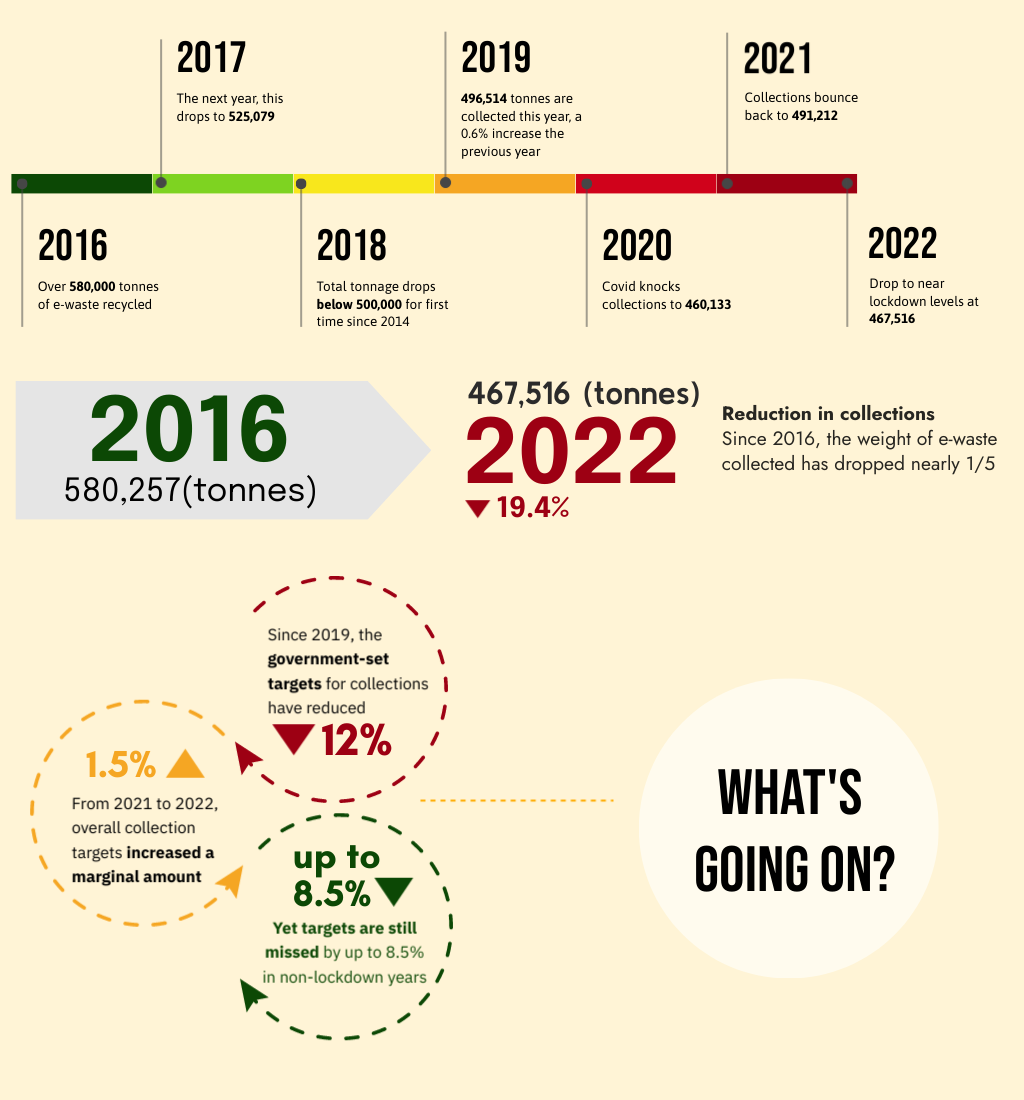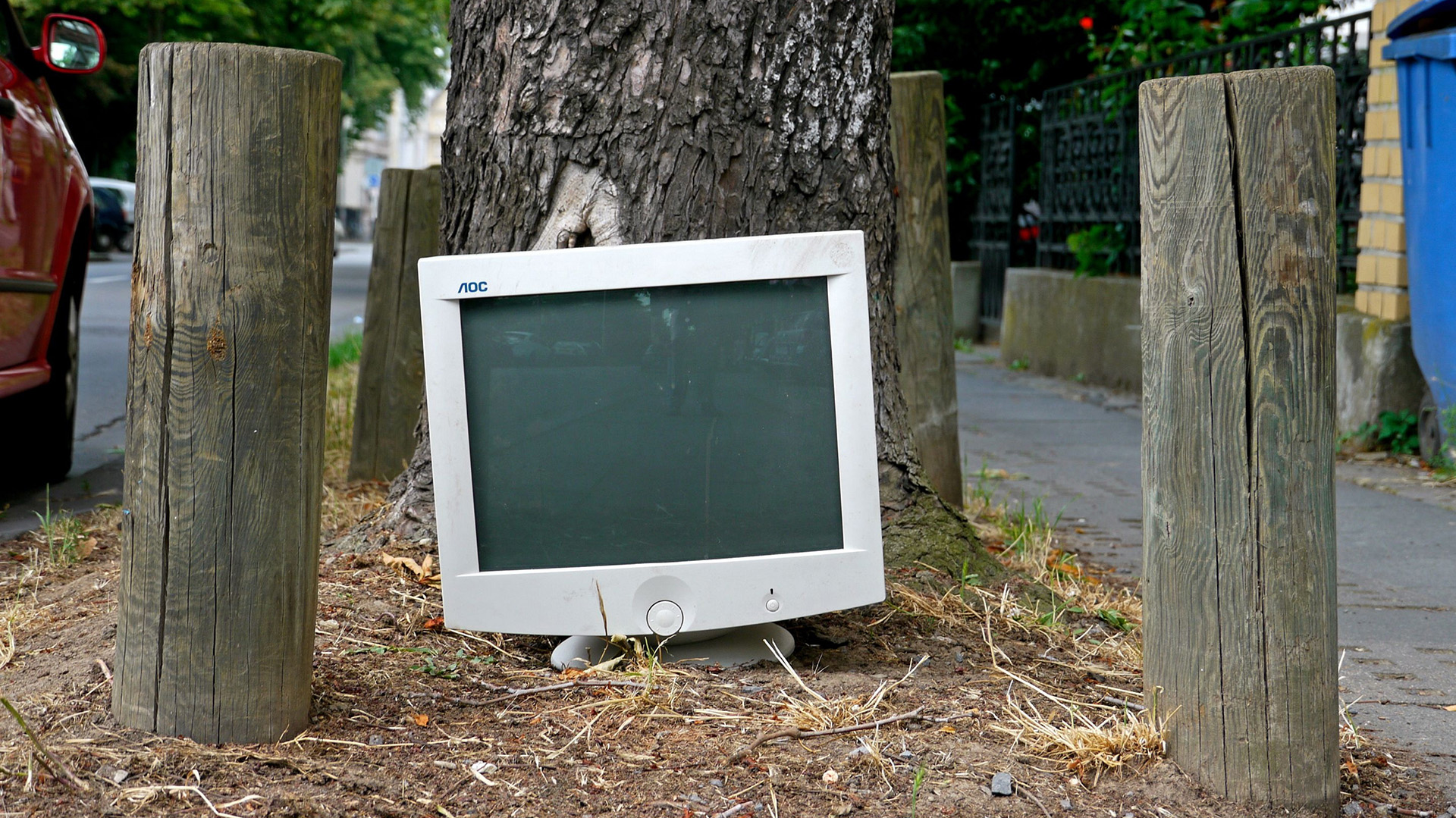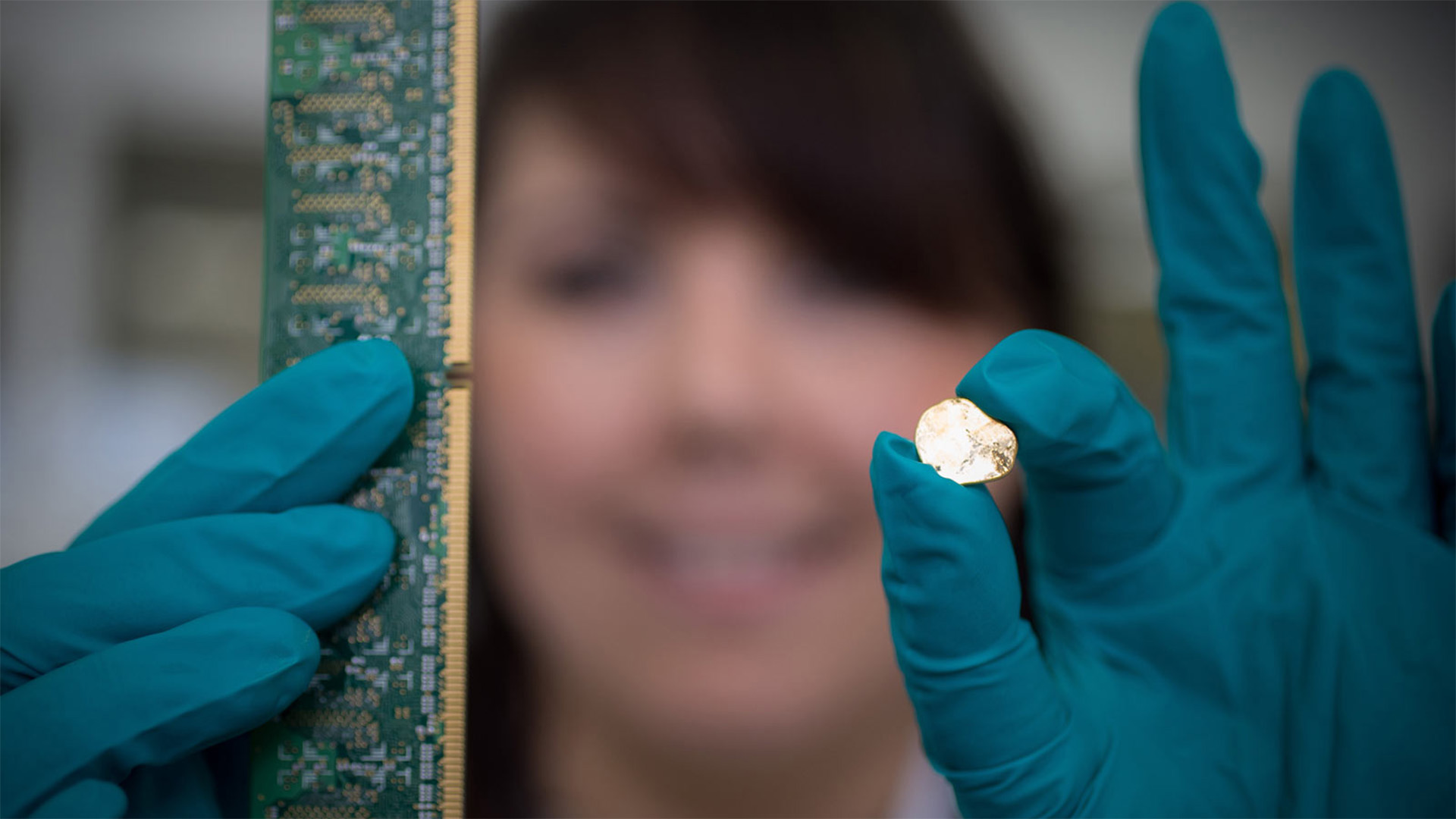The data suggests Britain's best years of electronics recycling are already behind it
But the raw numbers are hiding other trends behind Britain's plateauing recycling numbers, and an expert points to Covid and our changing attitudes to tech to provide answers.

E-waste is a big problem. We're sitting on piles of old electronics, PC parts, and peripherals, and I'll admit I'm extremely guilty of keeping this stuff around when I shouldn't. Luckily, there are many ways to recycle your tech, free-of-charge, which we should arguably be using more than we are today.
In the UK and EU, you'll see e-waste noted as WEEE, or Waste from Electrical and Electronic Equipment. Anything that's considered to be WEEE will come with a symbol that looks like a wheelie bin with a cross over it on the packaging or product, and any product with this symbol can be recycled, for free, under WEEE regulations.
WEEE can include everything from laptops, headphones, and PC parts to refrigerators, massage chairs, and, basically the devil incarnate for the environment, disposable vapes.
Yet despite official avenues for e-waste recycling and re-use across the UK, over the past few years the amount of e-waste that's been picked up for recycling or reuse through official channels, as measured by weight, has generally plateaued.
This issue isn't only for Brits to wrestle with. In 2019, it was estimated that less than 20% of the world's e-waste was properly recycled through official channels. It's being created at a faster pace than it's being dealt with, too, with expectations of the amount of e-waste being generated each year 74.6 metric tons (Mt) a year globally by 2030, versus around 53.6 Mt in 2019.
Yet according to the WEEE collection data provided by the UK Government, it looks like the UK's best years of electronics recycling are already behind it.
In 2016, a total of 580,257 tonnes of e-waste was collected from households in the UK. By 2022 that overall amount hit 467,517 tonnes, an almost 20% reduction.
Keep up to date with the most important stories and the best deals, as picked by the PC Gamer team.
During 2020, there was a drop in line with what you might expect for a year filled with Covid-19 related lockdowns. Yet even that doesn't explain away the reductions in the years prior to the pandemic. In 2019, 496,514 tonnes were collected, a 14% reduction versus 2016.

The UK Government, specifically the Department for Environment Food & Rural Affairs (DEFRA), sets the yearly targets for e-waste collections. That's understandably a tough job, as forecasting for just about anything often is, yet these targets are perhaps unsurprisingly often missed. Even if you ignore 2020, as a year impacted by lockdowns, the overall collection target was missed by 8.5% in 2022.
The government-set targets in themselves paint a disappointing picture of e-waste collections in the UK, having decreased each year since 2019 with the exception of a small increase between 2021 to 2022—an increase that led to an even greater miss for the year all-told.
The government expects 7% less e-waste to be collected in 2023 than last year. That means generally the slackening quantities of collections aren't close to picking back up yet.
But there's more to the UK's e-waste recycling than these numbers let on. I've spoken to Scott Butler, executive director of Material Focus, a not-for-profit organisation aimed at reducing the amount of electronics thrown away each year, to get a better picture of what might explain the UK's seemingly declining interest in e-waste recycling.
"[WEEE recycling] seems to have sort of plateaued. Obviously, we've had Covid in the middle of it, which has had a huge impact," Butler says.
But one important factor in the reduction is what Butler calls the "technology transition."
It's this concept of technology transition that could play a huge part in explaining why some categories have seen a tremendous reduction in WEEE recycling in recent years, including display equipment, which includes your old computer monitors and TVs.
The amount of displays being recycled has reduced massively since 2016, from 71,265 tonnes then to just 40,428 tonnes this past year. Butler chalks part of that up to decreasing weights due to flat panel screens prevalent today that are far lighter than older screens, but also this idea of a technology transition and how we as customers navigate new technology.
You had basically light products coming onto the market replacing old products.
Scott Butler, Material Focus
"Televisions are the best example of that. When we first started, it was just towards the end of cathode ray tube televisions being sold and flat panels becoming mainstream. So if you look at the weight distribution of what's sold, and what's recycled, [it's] bonkers for displays for a few years because you had basically light products coming onto the market replacing old products," Butler says.
"Then display [recycling] essentially tails off a little bit."

Not all technology replaces something else. During Covid lockdowns, people bought more freezers for storing food long-term, and these weren't replacing fridge-freezers they already had, only adding capacity. In terms of displays, Butler explains that massive old cathode screens were often thrown out or recycled when flat-screens came in, whereas new flat-screens often don't entirely replace older ones. Sometimes, these just move around the house–the smallest screen in the house gets chucked out or recycled, and replaced by the bigger one. And so it goes on and on.
Butler says there's also an analogue to gaming with gaming chairs, where new popular products don't necessarily replace old ones.
"People aren't buying that second gaming chair."
What this sort of alludes to is the idea that people just have more electronics in their homes. Part of that is we're using more technology than ever in our day-to-day lives. Take that second monitor you might have for Discord while you're gaming or dual-wielding spreadsheets. The flipside is that we're also just hoarding more technology.
It's essentially a question of what you do with your electronics once you're not using them. I, like many others, tend to stuff it in a drawer, but even old cables and chargers are classed as WEEE. And it's these things that are "easily binned," Butler says.
"It's the kind of thing that people might not know what to do with. And that can either then go in the bin, or will go in the cupboard, or the wardrobe."
We want throwing away to go away as an option.
Scott Butler, Material Focus
Even beyond this, Material Focus isn't entirely convinced that total weight is a representative number to gauge recycling success. Yet with admittedly loads of tech dodging recycling and ending up in landfills each year—as much as 155,000 tonnes of waste electricals expected to be thrown away each year in the UK and millions more hoarded away—change has to happen in the mindset of brits.
The answer to what you should do with your old electronics is quite obvious: find a proper way to recycle it.
"We want people to understand that when it is broken, recycling is the minimum thing that you do with it. And we want throwing away to go away as an option," Butler says.
If you're in the UK, you can find a place to recycle your electronics over at the aptly-named Recycle Your Electricals website, which is run by Material Focus. Though your local authority will also offer a way to deal with most stuff through a registered WEEE scheme, called a PCS.
Above: Recycle your Electricals has an informative video on what happens when you dispose of your e-waste properly, surprising considering it's coming from a hypnotic feline.
A PCS is an organisation whose main purpose is to deal with e-waste on behalf of any company that manufactures, imports, or rebrands electronics. Essentially, any company that introduces more than 5 tonnes of electronics into the country is required to cough up to cover the cost of dealing with those electronics once they're no longer useful, and they pay a PCS to do the dirty work. Those companies that fail to do their bit are charged a fee for their failures. That's actually how Material Focus is funded, by the fees collected from electrical producers when they don't meet the UK's recycling targets. That clearly happens a reasonable amount, as Material Focus is still going.
Though the regulations for small-fry producers differ a little, retailers are also required to offer take-backs for electronics. And that's one area where the messaging could be a little clear to customers.
Did you even know that most sizeable retailers that sell electronics must offer a free, in-store take back service? I asked my friends and family and the answer was an almost resounding 'no.' These are not often well signposted services, but Currys has one, and Amazon does too, as do many retailers. You can also find PC part sellers offering these take back services, like Scan, Overclockers [PDF], and Laptops Direct, to name a few.
We like to hold on to things a little bit longer sometimes, especially when so much of our life has been on it.
Page Motes, Dell
In the US, I've spoken previously with Dell's head of sustainability, Page Motes, regarding the company's take back program. Who also said we need to learn to let go of our old electronics.
"But it really is that kind of human piece that we like to hold on to things a little bit longer sometimes, especially when so much of our life has been on it," Motes told me in 2021.
The beauty is these services are completely free, often even postage, and you don't have to have bought your tech from these places to recycle with them. Usually when you buy a new version you can pop your old one over to be recycled, like-for-like.

And what happens with that e-waste once you get rid of it the proper way? It'll either get recycled, reused, or parts of it recovered. There are a lot of rare minerals inside your old laptop or PC parts, and a lot of old tech gets sent to other countries and precious metals melted down.
Our e-waste is an actual gold mine. Seriously, the Royal Mint is actually looking into ways of extracting gold from waste electronics in a bid to stop all these precious metals sat around in drawers and the bottom of cupboards from wasting away or ending up in a landfill. The truth is you're sitting on a veritable hoard of rare metals that could be put to good use and prevent more being dug out of the ground at great expense to the planet.

Jacob earned his first byline writing for his own tech blog. From there, he graduated to professionally breaking things as hardware writer at PCGamesN, and would go on to run the team as hardware editor. He joined PC Gamer's top staff as senior hardware editor before becoming managing editor of the hardware team, and you'll now find him reporting on the latest developments in the technology and gaming industries and testing the newest PC components.

